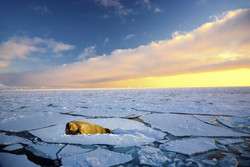What happens at the poles does not stay at the poles

Over the past 30 years, the Arctic has warmed more than any other region on the Earth. In fact, Arctic air temperatures have been increasing twice as much as the global average.
Arctic warming is causing changes to sea ice, snow cover, and the extent of permafrost in the Arctic. Over the past 30 years, Arctic sea ice cover has declined by 30 % in September, and frozen ground in the Arctic has started to thaw out. The Arctic region matters so much because it acts as a refrigerator for the rest of the world, and changes there could lead to strong feedback effects that spur further warming. It comes as no surprise then that the region has become the focus of intense research efforts.
Three EU Member States – Denmark (Greenland and Faroe Islands), Finland and Sweden – have territories in the Arctic, and the EU is a major contributor to Arctic research. Through the FP7 programme, the EU contributed around EUR 200 million to international research activities in the Arctic. And in its Communication on the EU and the Arctic region, the European Commission has stated that the EU should 'maintain the Arctic as a priority area for research to close knowledge gaps and assess future anthropogenic impacts, especially in the area of climate change'.
The European Climate Research Alliance (ECRA) has also identified Arctic climate stability and change as a priority area of focus. At ECRA's General Assembly (GA) in Brussels last week, Prof. Dr. Thomas Jung from the Arctic ECRA collaborative programme outlined the work that the team is doing in this area.
Involving 25 research institutions including bodies and operational centres in 10 European countries, Arctic ECRA aims to raise awareness of key scientific challenges, carry out coordinated research activities using existing resources, and set up coordinated, cutting-edge European polar research and education projects. The network includes experts in theory, observations, modelling, operational forecasting and logistics, and it is backed by access to large-scale infrastructure such as icebreakers, polar stations, aircraft and supercomputing facilities.
At the ECRA GA, Prof. Dr. Jung, who works at the Alfred Wegener Institute in Germany, explored the questions that Arctic ECRA, and indeed Arctic researchers at large, are addressing, namely: Why is Arctic ice declining so rapidly? What are the local and global consequences? Can polar prediction be improved?
It is clear that average monthly sea ice extent in the Arctic is in decline. It is also concerning that the composition of the ice is changing. According to Prof. Dr. Jung, first year ice is now far more dominant than multi-year ice, and the oldest, thickest ice (five or more years old) continues to decline. The National Snow and Ice Data Center (NSIDC) says that the decline of the older ice has prevented any significant recovery of the summer minimum extent: 'In essence, what was once a refuge for older ice has become a graveyard.'
What will the impacts of these and other changes in the Arctic be at local and global level? Prof. Dr. Jung pointed to a report by the insurer Llyods on opportunity and risk from the Arctic warming. The 'opening' of the Arctic as a result of melting ice will have impacts for oil, gas, mining, fisheries, shipping, logistics and Arctic tourism. We have already seen how many governments are eyeing up the region as access opens to new shipping routes and previously inaccessible oil reserves. According to the US Geological Survey, the Arctic holds 13 % of undiscovered oil and 30 % of undiscovered gas supplies. However, as Prof. Dr. Jung cautioned, this also leads to new dilemmas because disasters in the Arctic are likely to be 'much more painful' than those which occur at lower latitudes. Indeed, one observer at the ECRA GA insisted that the option of drilling in the Arctic should not even be under discussion as 'we know the oil needs to stay in the ground.'
'What happens at the poles does not stay at the poles': Prof. Dr. Jung borrowed a quote to convey the fact that Arctic melt leads to consequences beyond the Arctic region. Indeed, the European Environment Agency (EEA) tells us that a warming Arctic could lead to more extreme summers and winters in the Northern hemisphere, and has the potential to change many global systems from weather patterns and oceans streams to species distribution.
Unfortunately, climate prediction capabilities in the Arctic do not currently match those on lower latitudes. For example, we are lacking a good observational system. What we need, Prof. Dr. Jung concluded in his address to the ECRA GA, is better prediction capabilities to improve research in the Arctic.
More information: For further information please visit Arctic ECRA: www.ecra-climate.eu/index.php/ … ogrammes/arctic-ecra
Provided by CORDIS


















